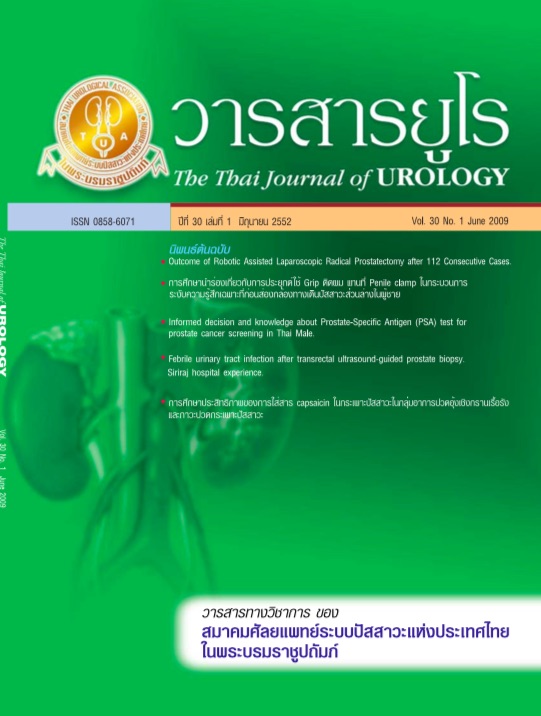Febrile urinary tract infection after transrectal ultrasound-guided prostate biopsy. Siriraj hospital experience
Keywords:
Urosepsis, transrectal ultrasound-guided prostate biopsyAbstract
Objective: To prospectively evaluate risk factors of febrile UTI after transrectal ultrasound-guided prostate biopsy at Siriraj hospital and determine complications after procedure.
Material and Method: Between January and December 2008, 809 suspected prostate cancer patients underwent transrectal ultrasound-guided prostate biopsy at Siriraj hospital. Underlying diseases, residual urine, demographic data, antibiotic prophylaxis, biopsy technique, patientûs preparation and complications after procedure were recorded.
Results: Five hundred and eighty six of 809 patients (72%) had post procedure complication. Complications were hematuria 523 (64%), hematospermia 21 (2.5%), hematochezia 160 (19.8%), fever 116 (14.3%), acute urinary retention 6 (0.7%). All bleeding complications were self limited. There was no mortality rate. In fever group, 17 of 116 patients required admission for urosepsis treatment. Comparison between non urosepsis and sepsis group post procedure, there was no statistically significant different in mean age (67+8 years vs. 64+9 years, p=0.3), median residual urine (36 cc. vs. 30 cc, p=0.567), diabetic mellitus (102(12%) vs. 3(17.6%), p=0.962), hypertension (284(35%) vs. 6(35%), p=0.47). Foley catheter indwelling time (14(2%) vs.0, p=0.534), mean number of prostate core biopsy (12+3. vs.14+3.7, p=0.880), mean times of prostate biopsy (1.2+0.5 vs. 1.1+0.3, p=0.518). Positive culture of organism was found in 6 of 17(35%) and only E.coli was identified. Fluoroquinolone resistant E.coli was reported 4 in 6 patients. All urosepsis patients were uneventful treated with parenteral antibiotics.
Conclusions: According to our study, most of the patients had complication after procedure which were not severe and self limited. Urosepsis was the most serious complication, although in standardized process. Furthermore, there were no significant risk factors to influence in the complication.
References
Parkin DM, Bray FI, Devesa SS. Cancer burden in the year 2000. The global picture. Eur J Cancer. 2001; 37 Suppl 8: S4-66.
Newcomer LM, Stanford JL, Blumenstein BA, Brawer MK. Temporal trends in rates of prostate cancer: declining incidence of advanced stage disease, 1974 to 1994. J Urol. 1997; 158(4): 1427-30.
Ilic D, OûConnor D, Green S, Wilt T. Screening for prostate cancer (Review) The Cochrane Library. 2007; 4: 1-27.
Watanabe H, Kato H, Kato T, Morita M, Tanaka M. Diagnostic application of ultrasonotomography to the prostate. Nippon Hinyokika Gakkai Zasshi. 1968; 59(4): 273-9.
Ramey JR, Halpern EJ, Gomella LG. Targeted biopsy of the prostate with contrast enhanced transrectal sonography in patients with previous negative biopsy. J Urol 2005; 173(4): 400
Halpern EJ, Strup SE. Using gray-scale and color and power Doppler sonography to detect prostatic cancer. AJR Am J Roentgenol. 2000; 174(3): 623-7.
Djavan B, Waldert M, Zlotta A, Dobronski P, Seitz C, Remzi M, et al. Safety and morbidity of first and repeat transrectal ultrasound guided prostate needle biopsies: results of a prospective European prostate cancer detection study. J Urol. 2001; 166(3): 856-60.
Raaijmakers R, Kirkels WJ, Roobol MJ, Wildhagen MF, Schrder FH. Complication rates and risk factors of 5802 transrectal ultrasound-guided sextant biopsies of the prostate within a population-based screening program. Urology. 2002; 60(5): 826-30.
Kapoor DA, Klimberg IW, Malek GH, Wegenke JD, Cox CE, Patterson AL, et al. Single-dose oral ciprofloxacin versus placebo for prophylaxis during transrectal prostate biopsy. Urology. 1998; 52(4): 552-8.
Lindert KA, Kabalin JN, Terris MK. Bacteremia and bacteriuria after transrectal ultrasound guided prostate biopsy. J Urol. 2000; 164(1): 76-80.
Enlund AL, Varenhorst E. Morbidity of ultrasound-guided transrectal core biopsy of the prostate without prophylactic antibiotic therapy. A prospective study in 415 cases. Br J Urol 1997; 79(5): 777-80.
de Jesus CM, Corr_a LA, Padovani CR. Complications and risk factors in transrectal ultrasound-guided prostate biopsies. Sao Paulo Med J. 2006 Jul 6; 124(4): 198-202.
Jeon SS, Woo SH, Hyun JH, Choi HY, Chai SE. Bisacodyl rectal preparation can decrease infectious complications of transrectal ultrasound-guided prostate biopsy. Urology. 2003; 62(3): 461-6.
Benway BM, Moon TD. Bacterial prostatitis. Urol Clin North Am. 2008; 35(1): 23-32.
Neal DE Jr. Complicated urinary tract infection. Urol Clin North Am. 2008; 35(1): 13-22.
Rodríguez LV, Terris MK. Risks and complications of transrectal ultrasound guided prostate needle biopsy: a prospective study and review of the literature. J Urol. 1998; 160(6 Pt 1): 2115-20.
Puig J, Darnell A, Bermúdez P, Malet A, Serrate G, Baré M, et al. Transrectal ultrasound-guided prostate biopsy: is antibiotic prophylaxis necessary? Eur Radiol. 2006; 16(4): 939-43.
Stoica G, Cariou G, Colau A, Cortesse A, Hoffmann P, Schaetz A, et al. Epidemiology and treatment of acute prostatitis after prostatic biopsy. Prog Urol. 2007; 17(5): 960-3.
Feliciano J, Teper E, Ferrandino M, Macchia RJ, Blank W, Grunberger I, et al. The incidence of fluoroquinolone resistant infections after prostate biopsy are fluoroquinolones still effective prophylaxis? J Urol. 2008; 179(3): 952-5.
Ghani KR, Dundas D, Patel U. Bleeding after transrectal ultrasonography-guided prostate biopsy: a study of 7-day morbidity after a six-, eight- and 12-core biopsy protocol. BJU Int. 2004; 94(7): 1014-20.
Berger AP, Gozzi C, Steiner H, Frauscher F, Varkarakis J, Rogatsch H, et al. Complication rate of transrectal ultrasound guided prostate biopsy: a comparison among 3 protocols with 6, 10 and 15 cores. J Urol. 2004; 171(4): 1478-80.



